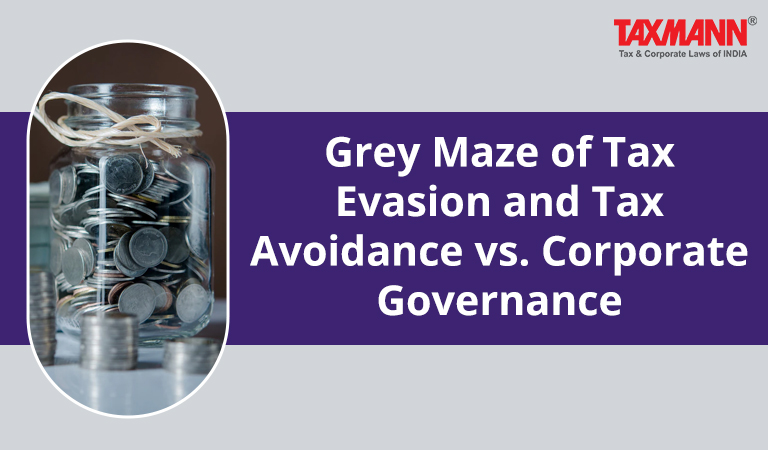Grey Maze of Tax Evasion and Tax Avoidance vs. Corporate Governance
- Blog|News|Income Tax|
- 6 Min Read
- By Taxmann
- |
- Last Updated on 21 June, 2022

Rishi Raj Bhardwaj – [2022] 139 taxmann.com 366 (Article)
“… In this world, nothing can be said to be certain, except death and taxes…”– Benjamin Franklin
Abstract
1. Introduction
Governance of a state is not a recent concept. Since the days of Kautilya’s Arthshastra, the rules of conduct of a king towards the people it served were prescribed and executed accordingly. Similar establishment and modus-operandi of governance were also followed in the other civilizations of the world. With the advent of joint stock companies, which has been comparatively recent in its origin; the governance of such companies also became an essential component of today’s economies. As a responsible corporate entity, each company is liable to return some part of its revenues, in form of taxes and duties to its government, which gave them approval and authority, to operationalize their respective corporate objectives. Therefore, irrespective of the varied operations and domains, in which a company may be involved, the assurance of transparency and safe returns on invested funds, majorly emerges from the separation of management from ownership. The very balancing act of trade-off between the profit maximization and wealth maximization, puts owners as well as the board of director viz. the management, in a kind of economic tug-war, which at times may sacrifice as well as compromise on the very ethical values, on which the good governance of a company is founded.
The categories and volume of distinctive stakeholders have been growing. They are no more, merely the shareholders, employees, customers, financers, creditors, tax authorities and the government. They can very well be just the conscious citizens of the society, in which a company may operate. Thus, compliance implications in the areas of accountability, transparency and fairness vis-à-vis to corporate governance are mounting, especially when more and more people are getting digitally connected in the contemporary age of internet economy.
2. Objectives of the Study
Broadly put, this paper primarily seeks to recognize and substantiate the existence of a clear relationship between the very principles of taxation in direct reference to the principles of a good corporate governance.
3. Taxation Precepts and Ethos vis-à-vis to Good Corporate Governance
Sometimes it is not the tax, but merely an anxiety of being taxed causes distress to an assessee (including a corporate one). Nevertheless, tax being an inevitable revenue earning component of every government around the globe, the taxation is levied throughout the ages under various principles and forms. All taxation structures in essence originate from the primary motive of collecting the revenues and end up with redistribution of those revenues among the members of the state. Essentially, each taxation directive is based upon a certain doctrine.
The classical taxation cannons proposed by the economist Adam Smith in his book “The Wealth of Nations” (1776) were equity, certainty, convenience, and efficiency; which may have well served just sufficient, as the guiding light towards maintenance of public finance and framing of economic policies. However, the contemporary decades, with the rise of multinational culture in the age of globalization, the world has observed a dramatic rise in the onus of justifying the rationale and bases of taxation policies, on the part of the government; which are often influenced by the political will of the governing and developing state, rather on the genuine rationale of taxation.
Click Here to Read the Full Article
Disclaimer: The content/information published on the website is only for general information of the user and shall not be construed as legal advice. While the Taxmann has exercised reasonable efforts to ensure the veracity of information/content published, Taxmann shall be under no liability in any manner whatsoever for incorrect information, if any.

Taxmann Publications has a dedicated in-house Research & Editorial Team. This team consists of a team of Chartered Accountants, Company Secretaries, and Lawyers. This team works under the guidance and supervision of editor-in-chief Mr Rakesh Bhargava.
The Research and Editorial Team is responsible for developing reliable and accurate content for the readers. The team follows the six-sigma approach to achieve the benchmark of zero error in its publications and research platforms. The team ensures that the following publication guidelines are thoroughly followed while developing the content:
- The statutory material is obtained only from the authorized and reliable sources
- All the latest developments in the judicial and legislative fields are covered
- Prepare the analytical write-ups on current, controversial, and important issues to help the readers to understand the concept and its implications
- Every content published by Taxmann is complete, accurate and lucid
- All evidence-based statements are supported with proper reference to Section, Circular No., Notification No. or citations
- The golden rules of grammar, style and consistency are thoroughly followed
- Font and size that’s easy to read and remain consistent across all imprint and digital publications are applied



 CA | CS | CMA
CA | CS | CMA
